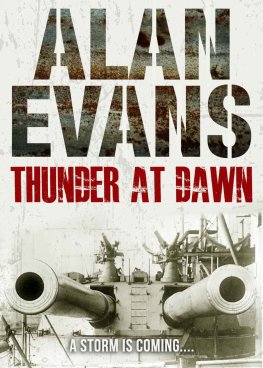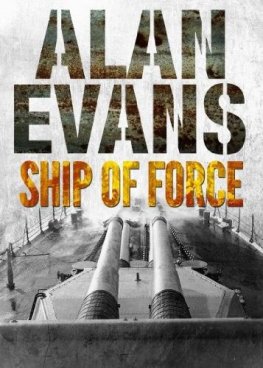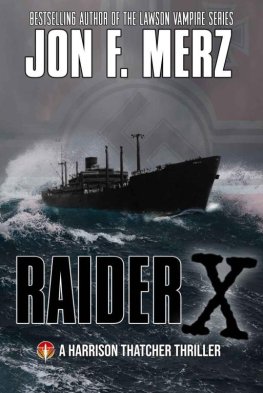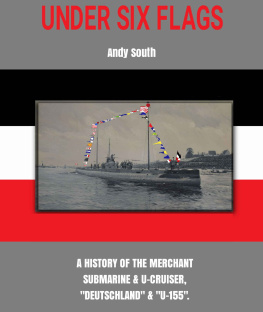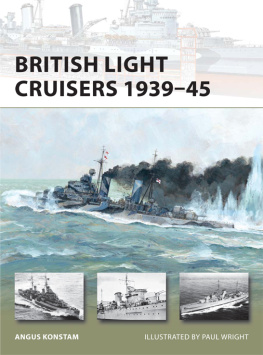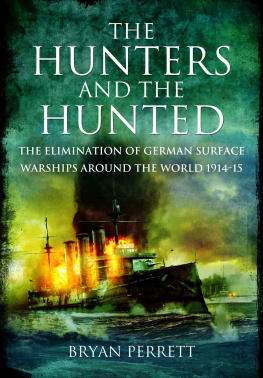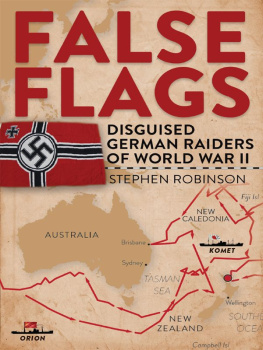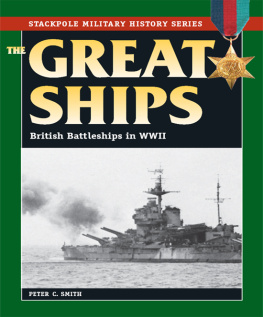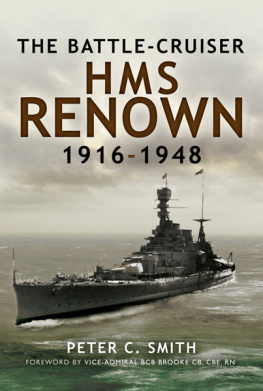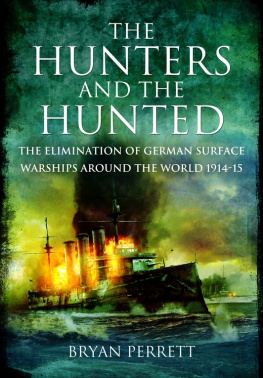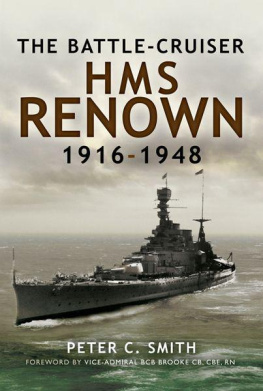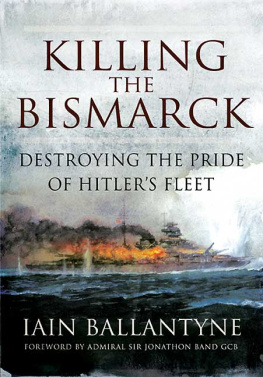Thunder at Dawn
by
Alan Evans
To my father, who was old Navy
Black as the hob of hell.
First of June 1916.
Off Jutland.
A wheeling darkness cut by the white wings of Sabres bow-wave. The Coxswain seemed to float like a wraith on the little open bridge as he shouted wide-mouthed at Smith. Black as the hob o hell, sir! But theres summat out there!
Smith grinned at him, cool. Cold. They were not good enough at this night-fighting and a destroyer was a fragile craft. Theyd had a taste of it an hour before, been hit and hurt and fired all their torpedoes. They raced on through the night, trailing the pin-point of red that marked Swordsman ahead, and ahead of her was the flotilla leader, Sentinel. While outside in the darkness
Young Gillies, the Sub, yelled, Ship! Red four-five! Challenge, sir?
Smith heard himself answer, No! He saw the looming black bulk of two big cruisers and just from that glimpse he knew them. But Sentinel challenged, signal-lamp blinking, only to be washed in the converging cones of searchlight beams and smashed as the cruisers guns opened up. The little ships, Swordsman and Sentintel, exploded in flame.
Sabre could try to run, or she could draw the fire.
Smith heard his voice crack as he yelled at the guns crew forward. Fire at the lights! The quickfirer broke into its barking. It was the only weapon they had. Hard aport! Sabre swerved and plunged at the cruisers and the lights burst on him, blinding him, revealing all of them on the little bridge as in the light of day, their sole protection the canvas dodger that barely kept off the spray. They were under fire from both cruisers so that Sabre ran through a forest of water-spouts like towering, white-topped trees.
The near-misses hurled the sea inboard, the hit aft heeled Sabre over. The blast from another threw Smith to the deck and the gun had gone, leaving a crater that belched flame. Sabre rolled under him and Gillies fell on him, his serious young face blank and eyes wide.
The lights snuffed out, Sabre capsized and Smith fell into the reaching dark, the sea wrapping cold around him.
* * *
He woke, sweat cold on his skin, threshing in the big bed. The woman, still sleeping, mumbled and reached out for him but he slid away from the hand, out of the bed. He stumbled, groping, across the dark room to the window, twitched back one curtain and stared out at the day. It was barely light, a winters dawn come grey under the hanging pall of Londons smoke. The street lay quiet between the high, handsome faces of the houses of the wealthy. Only one old man shuffled along, shoving a barrow, collecting the piles of horse manure with brush and shovel.
Smith, shivered, standing naked at the window, the body seeming frail, ribs standing out under the taut-stretched skin, scarred. The dream came only rarely now but still real as the real nightmare had been. He wondered if he would ever be quit of it. He stared out at the street. It was a strange place and he was still a stranger here. He turned from the window, restless, found his clothes and dressed quickly. He spared one glance for the bed, the room in half-light now from the crack he had left in the curtains. The woman sprawled, full body loose, breasts spilling from the silk of the nightgown, the lips slack in exhausted sleep.
Last night, last week, last
It was time he was gone.
He moved quietly down through the house, silent but for the slow-ticking clock in the hall and let himself out into the morning.
He must see the doctors again, and surely they would pass him fit this time.
He walked quickly, a middle-sized, slight figure in the dark blue of the Royal Navy with the three gold rings of a Commander. A very young man for that rank. A thin face, sharp-featured under the cap, with pale blue eyes. Not handsome. He walked quickly and it was not because of the cold. There was an urgency about him.
Time he was gone.
* * *
Later that day they talked of him at the Admiralty. It was close to noon but London was still shrouded in that dirty, grey light. In the Admiralty the lights burned yellow and a fire crackled in the grate.
The Captain read from the folder: David Cochrane Smith. He paused, then: Unusual background. He looked across at the Admiral curiously.
Who answered shortly, A village boy from a village shop. For an officer its extraordinary. He stared coldly at the Captain. Take the advice that was given to me: Mind your own business.
The Captain flinched, swallowed then returned to the folder. The doctors think he went back to sea too soon after that sinking at Jutland. Then to be carted ashore again with a wound He shook his head. They say they will pass him fit but he must not return to the Grand Fleet; its too early for active duty of that kind.
The Admiral snapped irritably, Active duty? Thats the trouble. Hes been too damned active.
And shed follow him to Scapa Flow.
Shed find it damned uncomfortable.
Shes a very wealthy woman. She could make it comfortable.
I doubt it. But she could make a nuisance of herself. Blast the woman! Shes like a bitch in heat!
Yes. The Captain thought the simile apt. But shes an extraordinarily attractive woman to be panting over him. I wonder what she sees in him? And shes not the first.
The Admiral muttered under his breath, glaring into the fire.
Sir?
I said, the Admiral repeated distinctly, what a bloody mess. On top of the woman theres this rumour. He has to open his mouth at one of her parties and who does he open it to? A gas-bag! Who tells his tale all around town. Enough men killed. The Navy ought to stay at home. Good God! The near-bellow rumbled away and after a moment he went on, Theyve labelled him as a defeatist. The story has even gone around the Fleet. Did you know that? I got a signal from Scapa asking me if it was true! We cant send him back even if the doctors would allow it, not with that label around his neck. And thered be questions in the House if we tried it. But I want him out of this, well clear of her and the newspapers. I dont want him away for ever; just long enough for this to blow over, for the truth to be told and accepted; and quick enough to avoid another scandal with her. Hes a good officer.
He has a wild reputation.
Thats not the same as being wild. Hes a man who seizes action when the opportunity offers and hes had plenty of offers. Hes a good officer.
But not indispensable?
No one is indispensable. He added with grim sincerity, Thank God.
There was silence in the room while they mentally reviewed alternatives. The Admiral broke it. I have it. A ship that returns to home waters in the summer at the end of her commission, and far enough away now. And shes shorthanded.
Where? Which ship?
The Admiral reached for his pen. On the West coast of America. Thunder.
March 1917.
The night was dark under an overcast sky. H.M.S. Thunder, a darkened ship, was a black speck on the black immensity of the Pacific. Her crew were tensed at their action stations and Commander David Cochrane Smith stood on her bridge gratings, peering with his hands clenched tight on the rail. Look-outs strained their eyes against the darkness. Somewhere to the east lay the coast of Peru but the enemy was close.
A look-out shouted, Ship bearing green four-oh. There was a rumble as the guns trained around and the searchlights on the wings of the bridge and up in the tops twisted in their mountings. They crackled into life, their beams stabbed out across the dark sea to light up the target on which the guns were lined. They lit up

